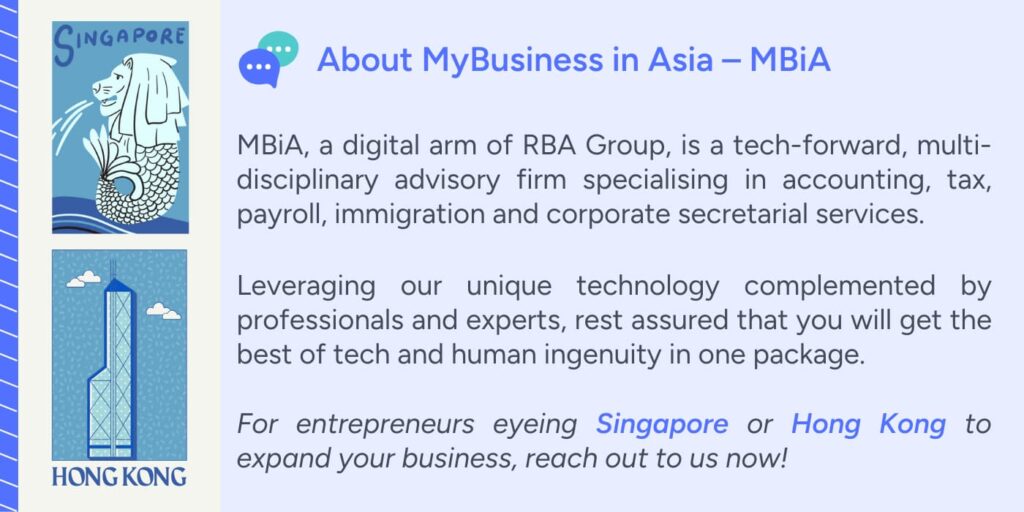This corporate guide is designed to give an overview of the different types of registration and incorporations in Singapore such as the private limited company, the sole proprietorship, the branch office, etc. Keeping in mind the role of company officers (shareholders, directors, and corporate secretaries), the registration of an entity in Singapore is made out of requirements that can be bridged by the appropriate services. All about how to register a business in Singapore just below.
- The right business structures for your needs
- Common concerns when registering business in Singapore
- How to simplify the registration process?
The right business structures for your needs
Singapore offers numerous business solutions to first-time entrepreneurs starting their business ventures in the city-state and to foreign businesses expanding in the region. We have selected the three must-know business structures for Entrepreneurs, Startups and SMEs when setting up a company in Singapore.
For micro-businesses and individuals
The sole Proprietorship is the best option for first-time entrepreneurs starting small. Any self-employed Singapore citizen or Permanent Resident, conducting continuous activities for the purpose of gain under the name other than its own, is eligible to register a sole proprietorship.
The main benefit of registering a Sole Proprietorship is the streamlined registration process with the Accounting and Corporate Regulatory Authority (ACRA); you just need to choose (i) a business registration name (if you are not using your own) (ii) a local business address for the proposed business; and (iii) a brief description of the main business activities.
The main drawback for Sole Proprietorship is not being a separate legal entity from the entrepreneur. This means that the business owner will be directly and personally liable for all the obligations undertaken by the Proprietorship during the course of business and all the profits of the company will be treated as personal income.
For business founders willing to scale and raise capital: the sole proprietorship will discourage potential investors as it is not fit to scale operations and to protect outside funds injected in the business.
For SMEs, Startups and Entrepreneurs
The Private Limited Company is the most widely chosen business structure, selected by Entrepreneurs, SMEs and Startups too. It is the legal vehicle that allows the most flexibility while remaining attractive to investors, directors and business partners. The main benefits are:
- It is a separate legal entity from its founders and shareholders, its financial liabilities are limited to the Singapore Entity
- It can be 100% owned by foreign shareholders and the minimum share capital required is 1 SGD
- It allows great flexibility to increase its capital, welcome new investors and expand its Board of Directors
- It enjoys the local tax benefits
- It can be incorporated in 1 day
The main local requirements
- The presence of one Resident Director in the board of the Singapore business. The resident director can be a Singaporean citizen, a Singaporean Permanent Resident or a Foreigners with a working visa under the company itself. How to appoint a Company Director in Singapore?
- To appoint one local company secretary. The company secretary is responsible for administering the business and maintain the minutes books and registers. Here’s more on the key role of the company secretary in Singapore.
- The Companies Act also provides that every limited company shall have a registered office address in Singapore from the date of the company incorporation and throughout its existence. Find out more on the: registered office address for companies in Singapore.
Check our Corporate secretarial services Singapore, Bookkeeping Services Singapore, Accounting services Singapore, and all about Sole Proprietorship Singapore.
For Foreign Businesses operating in specific sectors
The Branch Office is often chosen by foreign businesses when registering an entity in Singapore. The branch of foreign company it is not considered a separate legal entity, but as a registered extension in Singapore of its parent company.
The parent company is implicitly directly liable for all the debts and liabilities of the branch, unlike a Singapore Private Limited company.
The Accounting and Corporate Regulatory Authority (ACRA) imposes certain restrictions on the Branch Office:
- The business activities have to be the same as the Parent Company
- The local tax benefits are not available for the Branch Office
- The entity name must be the same as the Parent Company’s one
- The Financial and Legal liabilities extend to the mother company
- Extended to Parent Company
- There must be at least 1 authorized representative who is resident in Singapore (can be a Singaporean citizen, a Singaporean Permanent Resident or a Foreigners with a working visa under the entity itself)
Although the branch registration process is longer compared to the incorporation of other business structures and the local legal framework imposes limitation, the Branch is chosen by foreign entities to leverage on the foreign company’s brand and structure when submitting tenders for contracts or obtain financing in Singapore.
In summary:
| Private Limited | Branch Office | Sole Proprietorship | |
| Legal Type | Separate legal entity but an extension of the parent company | Not a separate legal entity distinct from its parent company | Not a separate legal entity distinct from the owner |
| Foreign Ownership | 100% foreign owned | 100% foreign owned by Parent Company | No, 100% locally owned |
| Entity Name | Can be unique | Same as Parent Company | Can be same of the owner or unique |
| Business Activities | It can choose any | Same as Parent company | It can choose any |
| Paid up Capital | Required, minimum 1 SGD | As per parent company | Limited to personal finances |
| Timeline | 1-2 days | 2-3 days | 1-2 days |
| Taxation | Enjoy local tax benefits | Local tax benefits not available | Not applicable |
| Closing Down | Approx. 6 months | Approx. 1-2 weeks | Approx. 3 days |
| Accounting / Bookkeeping | Yes | Yes | No |
| Corporate Tax Filing | Yes | Yes | No |
| Annual Return | Yes | Yes | No |
| Financial Audit | Subject to conditions | Both Parent company and SG Branch | No |
| GST | Yes – subject to conditions | Yes – subject to conditions | No |
The other company registration considerations
One of the early steps of the company creation is to find a name for the company. The name can be reserved with the Accounting and Corporate Regulatory Authority (ACRA) and at the same time submit the future business activity of the entity. The business activities in Singapore are sorted by the Singapore Standard Industrial Classification (SSIC) which attach a code to each different activity.
One of the other significant decisions is the Financial Year End (FYE) for the accounting period. The accounting period is generally 12 months (one year) and will be important for the business as the FYE coincides with the due dates of corporates filings and taxes. The Annual general Meeting (AGM) is also due 6 months after the FYE, while the Annual Returns are due 7 months after FYE.
Some key consideration in the company creation includes the director appointment. Indeed, each private limited company in Singapore requires one resident director.
The timeline is important as foreigners often go for the Employment Pass to live and work in Singapore. The Employment Pass is a type of visa that is sponsored by the Singapore based company. With processing time in between 3 to 6 weeks, the Employment Pass cannot be issued to a foreigner to take on the duties of resident director on the date of the company incorporation.
Thus, many foreigners resort to having a local nominee director before being issued the Employment Pass and being able to become local director.
Common concerns when registering business in Singapore

What are the documents that you will need to register your business?
Generally, for every individual holding a significant position in the business – directors, individual shareholders, Ultimate Beneficiary Owners (UBO), Branch authorized representative – you need to provide a copy of Passport and recent Proof of Address.
Most of the time, the foreign companies with interest in the Singapore business (corporate investors and parent company in case of Branch Office) will need to provide a copy of:
- Certificate of Incorporation of the foreign company
- Constitution of the foreign company
- Business Profile of the foreign company
Why do I need to provide these documents?
Singapore has established a strict and rigorous anti-money laundering (AML) and countering the financing of terrorism (CFT) regime through its comprehensive and sound legal, institutional, policy and supervisory frameworks to ensure that Singapore is not a safe haven for money launderers and terrorist financiers.
As your Local Consultants we ensure your business will comply with the local regulations and requirements. We continue to guide you through the corporate registration and streamline the processes to register your company.
Do I need a license to start my business in Singapore?
Most businesses do not require additional licenses to operate in Singapore, however you will need to obtain the activation of the Custom Account from the Singapore Custom Authority should you need to import goods into Singapore.
Compulsory licenses are required for business operating as food establishments, building constructions, educational institutions, travel or employment agencies, telecommunications companies, or financial institutions.
How to open a Bank Account?
Open a business bank account in Singapore for a newly incorporated company might be a challenging and lengthy process. Singapore banking environment offers numerous solutions and MBiA has partnered with the best on the market to simplify the Business Bank Account opening process.
Alternative to Bank account opening, the business account
As delays in the compliance and KYC processes of banks are becoming more frequent, it can take up to 6 months to open a corporate bank account in Singapore. Indeed, requirements related to shareholders and directors are more becoming more stringent.
To mitigate these issues, we offer our clients with recent company incorporations to register a business account in Singapore. Unlike the bank account, the business accounts services are faster to open for limited companies with average time of 14 days.
They enable international payments with low fees and provide global accounts with multi-currencies. There is also no opening and management fees for the accounts.
Tax and Accounting
Singapore corporate tax rates are summarized below:
| TAX | SINGAPORE |
| Corporate Tax | 17% |
| GST | 7% (increasing to 8% in 2023) |
| Capital Gains Tax | – |
| Personal Income Tax | 2% – 23% |
| Withholding Tax Dividends Interests Royalties | 0% 15% 10% |
| Double Taxation Relief | Yes |
| Foreign-Sourced Income Tax | May be taxable if received or deemed received in Singapore |
It is important to note that the Singapore government has introduced a number of incentives / programmes for newly incorporated businesses and to help existing companies improve efficiency, strengthen capabilities and explore new opportunities – some cater to start-ups and local enterprises and others for global with larger scale needs. Schemes include:
- Assistance in manpower development
- Technological equipment
- Upgrading
- Research and development (DEI, Pioneer Incentive Scheme)
- Intellectual property and
- Industry development
- Event Organizers
How to simplify the registration process?

MyBusiness in Asia has designed a hassle-free process to register and manage Singapore companies. We have streamlined the entire workflow to make it simple, digital and value focused. We leverage on our own company registration and corporate platform:
- Go paperless, business registration and all your forms and filings appear in your virtual dashboard
- Integrated messaging service: share documents, e-sign and message your dedicated team anytime you need
- Integrated payment solutions – choose between Bank Transfer, Credit Card, PayPal and more.
- We incorporate tailored advises for structuring and administration of your business in Singapore
Digital solutions complemented by professional expertise: we provide high quality services combining innovative technology with expert consultants. MBiA blends together years of technical expertise with innovative solutions to simplify the business registration process for business owners.
We provide to Entrepreneurs, Startups and SMEs the best Corporate, Accounting and Tax services to allow them to thrive in a competitive market.
Starting a business can be a demanding and time-consuming undertaking. Throughout the years we have gained deep cross-industry experience, which enabled us to create tailored services for businesses registering in Singapore. From single entrepreneurs to SMEs with regional operations, from e-commerce to media companies, we can register your private limited company. Contact MBiA for expert advice.


